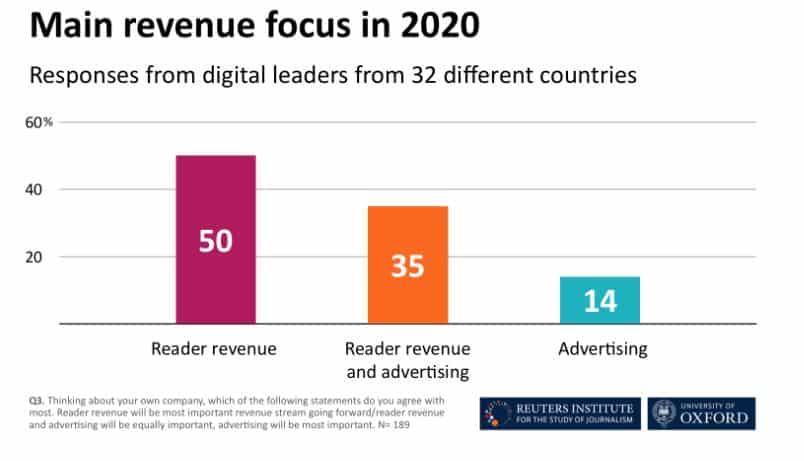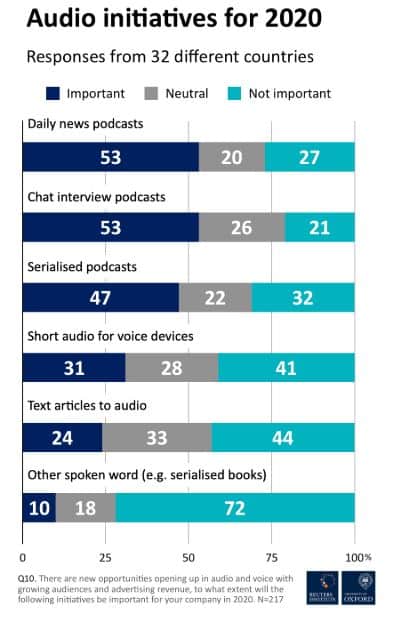Over 50 per cent of publishers are looking to increase reader revenue to be their main income stream in 2020 and beyond in addition to launching podcasts and increasing their use of AI, according to a new study by the Reuters Institute for the Study of Journalism.
The Journalism, Media, and Technology Trends and Predictions 2020 report is based on a closed survey completed by 233 senior executives from 32 countries including Australia, and provides insight for the year ahead and aim to identify the most important media trends.
Over half of the survey participants were from a print publishing background (54 per cent), 14 per cent came from digital-born media, and 6 per cent from B2B companies or news agencies.
Nic Newman, Senior Research Associate at the Institute, says “The last 10 years were defined by the twin technological disruptions of mobile and social media, which fragmented attention, undermined advertising-based business models, and weakened the role of journalistic gatekeepers.
“The next decade will be defined by increasing regulation of the internet and attempts to re-establish trust in journalism and a closer connection with audiences. It will also be rocked by the next wave of technological disruption from AI-driven automation, big data, and new visual and voice-based interfaces.”
He says that the “overwhelming mood from this year’s survey is one of quiet determination not to be distracted by the latest innovations but to focus on delivering long-term value for audiences,” while explaining that there is no one path to success, but there is greater confidence that publishing can succeed in a digital age.
Distrust of digital platforms continues
Globally, the report found that the power of digital platforms such as Google and Facebook remains a concern for most publishers, but there are mixed views on regulation. The report found that, overall, publishers don’t want hand-outs from these platforms but would prefer a “level playing field” where they can compete fairly and receive appropriate compensation for the value of their content.
“Publishers remain resentful about what they see as unfair competition from platforms and tech companies. With regulation looming, we’re likely to see publishers pushing their rights harder than for many years.”
Reader revenue will become main income for many publishers
Of the survey respondents, 50 per cent of publishers said that reader revenue will be their main income stream in the future, while 35 per cent think that advertising and reader revenue will be equally as important, and just 14 per cent are planning to rely solely on advertising revenue.

The report found that many European publishers are looking to rely on a variety of premium content, paid subscription or membership models.
However, Newman says that success is not guaranteed: “Growing competition for a limited pool of people prepared to pay for news is likely to be a challenge this year as subscription models mature. Heavy discounting is already widespread and churn rates are likely to become an increasing worry for those that can’t prove consistent value to audiences.”
The report says that monetising audiences will require a deep commitment over time as well as new skills and processes.
At the very least, collecting first-party data – in the form of asking for registration in return for content – will be a key focus for publishers, a likely response to reduced cookie support from leading browsers and tightened privacy regulations in Europe and North America.
There are concerns about the barriers that this will pose for casual newsreaders.
“With more high-quality journalism disappearing behind registration barriers and paywalls, the democratic dangers may also become more apparent in the year ahead. The fear is that serious news consumption will be largely confined to elites who can afford to pay, while the bulk of the population pick up headlines and memes from social media or avoid the news altogether,” the report states.
Podcasting is an important growth area
One of the ways in which those surveyed are looking to solve the engagement of casual newsreaders while moving to pay-walled models is via other accessible formats like events and podcasts.
Over half (53 per cent) of publishers said that podcasting would be important, while others are looking at turning text articles into audio as a way of capitalising on the increase of voice and audio formats.
Newman says that podcasting revenue is projected to grow by about 30 per cent a year to reach over $1 billion by 2021 in the US, while revenues elsewhere have been slower to build despite the clear audience opportunity particularly amongst younger audiences.
Reuters predicts that better headphone technology, such as the AirPod Pro, will give a further boost to audio formats in 2020, in addition ot the continued roll-out of 5G networks around the world enabling faster and more reliable mobile connectivity to access to multimedia content.
But the report states that gaining and keeping attention without compromising on quality (and trust) remains a key challenge within the podcasting format.
Personalisation will be used to distribute online content more effectively
More than 50 per cent of survey respondents, mainly news organisations, said that AI will be important in 2020 to ensure the right content is being delivered to their audiences. Types of AI being considered include:
- Creating better article recommendations (over 50 per cent of respondents)
- Commercial uses such as using AI to target potential subscribers and optimise paywalls (47 per cent)
- AI-assisted subbing or tagging to drive greater efficiency in the editorial team (39 per cent)
- Newsgathering (16 per cent).
The report also predicts that transcription, automated translation, and speech-to-text text-to-speech services will be some of the first AI-driven technologies to reach mass adoption this year, opening up new frontiers and opportunities for publishers.
“Against this background, artificial intelligence offers the possibility of more personal and relevant news services, as well as more efficient ways of packaging and distributing content,” the report says.
“But platforms will need to play a role too – especially in helping publishers reach new and diverse audiences. In this regard, the growth of content licensing via the Facebook News tab and Apple News+ is an intriguing development that will be fascinating to watch, despite widespread industry cynicism. For Facebook in particular this initiative will be critical as it looks to win back trust from publishers.”
The full report can be accessed on the Reuters Institute for the Study of Journalism’s website.


